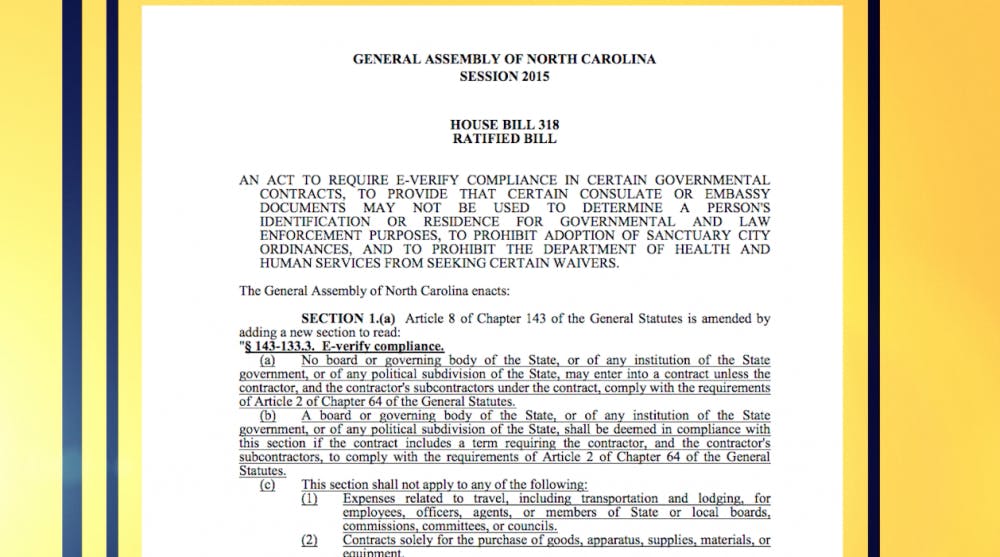A new amendment added to House Bill 318 could quell some of the concerns local law enforcement officers had regarding ID cards.
As Elon Local News reported on Monday, the controversial HB 318, the Protect North Carolina Workers Act, is a bill to make stricter rules for employers that are verifying whether or not their employees can legally work in North Carolina. Specifically, it would increase the number of employers that are required to use the federal E-Verify program. Critics of the bill say it targets the immigrant community.
The bill also included a section that would have imposed tighter rules regarding what types of ID cards local law enforcement officers can help issue and accept as legitimate forms of identification. This section was included in the bill that was ratified by the North Carolina General Assembly on Tuesday night, Sept. 29 but as of 4 a.m. Wednesday Sept. 30 that section changed due to a technical amendment.
The rules is now that law enforcement officials can accept privately issued ID cards if they are the only form of identification available.
The section in the ratified bill concerned local enforcement officers as it put a local ID program in jeopardy.
[youtube=https://youtu.be/PwZfSskLA9M&noredirect=1&w=560&h=315]
Support for FaithAction
The Faith Action ID program was established by FaithAction International House, a nonprofit organization in Greensboro. The program provides an alternative ID program to residents of certain communities that cannot get a government issued ID. The program came to Alamance County this summer, as Blessed Sacrament Church and the Burlington Police Department partnered to implement the program locally.
Jeffrey Smythe, Chief of the Burlington Police, supports the Faith Action ID program as he believes it builds trust between the his department and the local immigrant community and gives the members the confidence to call the police when they need help.
"I think in Alamance County, there have been situations and times when people who are hispanic have felt like the police were picking on them and you should not feel that way today and tomorrow this police department treats everyone with dignity and respect," Symthe said, speaking to a room of Faith Action ID applicants at the most recent drive on Sept. 23.
Smythe said the IDs are also a help to his department as they provide an easier way to vet the identities of witnesses to crime. The Alamance County Sheriff's Department disagrees.
Ben Ansbacher is a member of Fairness Alamance, a non-profit organization focused on immigration issues in Alamance County. He has volunteered with some of the local ID drives, since they began this summer. He said he believes that as the program isn't hurting anyone there is no need to shut it down.
"It's just a program to make life a little easier for some of our neighbors and taking it away, I don't see what good it does for anybody," he said.
Opposition to Alternative IDs
The Sheriff's Department has never accepted the ID program and Randy Jones, the public information officer, said that's because these non-government issued ID cards are too easy to fake.
"It doesn't have to do anything necessarily with someone being here illegally. It can be someone trying to commit other crimes," he said. "It can be someone who's trying to escape justice. It could be a U.S. citizen cause I've seen that. I've seen false IDs for years."
Jones also said that he does not agree that the ID cards are necessary to build confidence between law enforcement and the community.
"I'm not sure I understand that as far as why you have an ID is going to make you more confident to talk to me," Jones said. "I've talked to many folks over my career conducted many investigations without having people present me an ID."
The Sheriff's department did say that they will look at Faith Action ID cards if they believe it will help them in an investigation but will continue to only accept government issued IDs as the only form of "proof positive" identification.
Now with this amendment the bill does not take away the Faith Action ID program but other immigration advocates in the state are still worried about what the bill says about another form of ID typically used by immigrants. According to HB 318, matricula cards or ID cards issued by the Mexican Consulate are no longer acceptable forms of identification. The same rule applies to other forms of identification that are not passports issued by other consulates.
The reasoning behind this rule is to address concerns that these documents can be falsified.
As of Oct. 1 at 11:30 a.m., Governor Pat McCrory has not yet signed the bill. If McCrory does not sign or veto the bill within 30 days, it automatically becomes a law.


